If it seems like I often mention Solid Design being key to a well-made game, it's only because I believe it: design is the foundation upon which any project is built, after all. Done well, it goes largely unnoticed – leaving an audience free to enjoy other components (such as graphics, sound or writing); done poorly, it becomes the only thing people will remember about the experience; and if the design scale seems precariously balanced between the two extremes, well, then you're probably dealing with a game like I Was a Teenage Exocolonist: well-designed, but only up to a point.
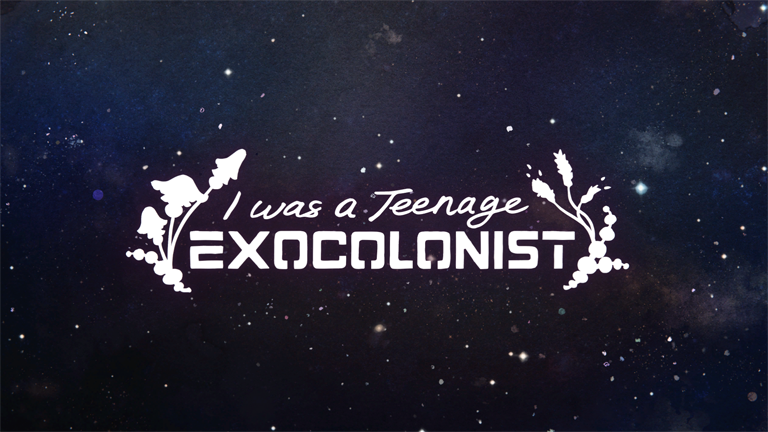
Made in 2022 by Northway Games (a husband and wife team from distant Canadia), the game plays like a cross between a visual novel and a card game, with an intriguing NG+ twist thrown into the mix, and casts you in the role of Solana/Solane/Solanacea – the 10 year old offspring of colonists bound for the distant world of Vertumna IV and (hopefully) a fresh start and a brighter future.
Unfortunately for the colonists, their hopes (along with their ship) are dashed during an emergency landing (bummer); the planet turns out to already be inhabited (double-bummer); and the locals don't take kindly to strangers (yikes!). The colonists are left to fend for themselves on a harsh and increasingly hostile world – and that is where your character gets to grow up.
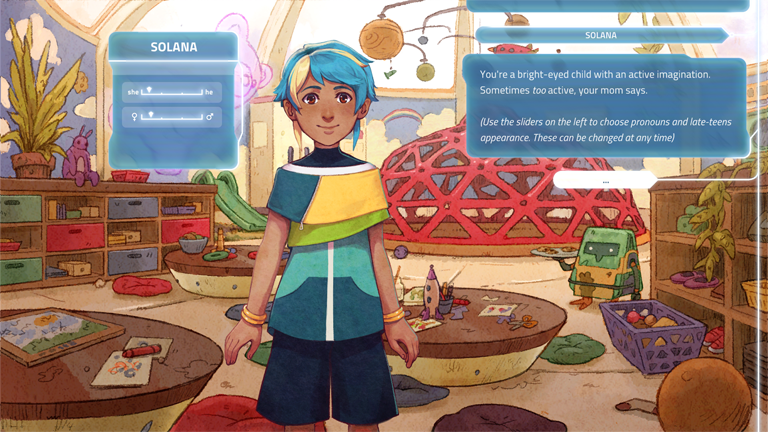
The game lasts for 10 years (until the PC turns 20) and each month you get to decide what activity Sol will take part in, which shapes their statistics and personality.
Strong points first, IWATE is gorgeous – with pristine hand-drawn graphics, a mellow soundtrack and very strong character design and writing.
Each of the children you grow up with have their own interests and seeing them evolve into teens and young adults is handled with logic and consequence. As for the cast of supporting characters – such as your loving, hydroponics-bound parents, stern-but-fair governor Eudicot, insatiably curious chief surveyor Utopia or even cheerful educator Hal – they have enough depth to them to make them feel relatable and real, each with their own ideas for how the colony should develop. I especially liked the maturity with which characters treated each other and the idea that just because you don't agree with someone doesn't mean you can't respect them is something the Real World could definitely use more of.
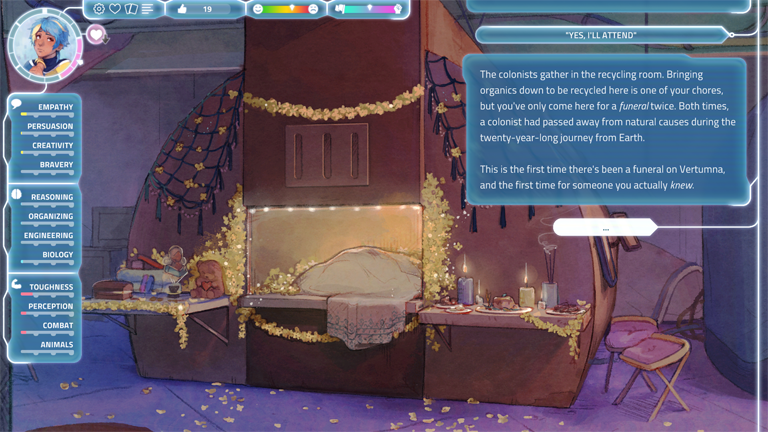
For all its vibrant visuals, IWATE is not at all lighthearted and deals with serious topics such as death, loss and perseverance – as befitting a tale about a group trying to carve out a niche in an environment actively trying to kill them.
In terms of the story, it is clear a lot of thought went into the plot, world-building and character development. It is particularly neat (and not something you get to experience in other games) to see characters' reasoning change in response to events. A person you may feel completely in-tune with at 12 can change into someone you have trouble seeing eye-to-eye with at 14 and the way NPCs continue to mutate is probably the best aspect of the game.
The same, however, cannot be said for the card-game aspect, which is (unfortunately) how the game handles resolution for all of its 833 (!) story events. Whether you are studying humanities, fighting off a monster horde, tilling a field or playing sportsball, you will be playing the same, fairly basic, card game to see if you can arrange available cards in such a way that their combined value meets a certain quota.
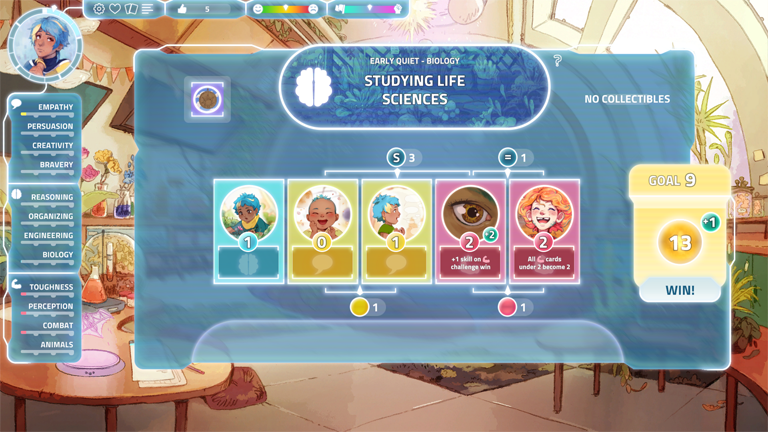
There is a little variation to it – with items and perks that modify card values and slightly different rules that depend on a given situation – but not nearly enough to overcome the sheer grind of going through the same paces in every month, every activity and every situation. It seems odd that, for such a well-though-out backstory, so little consideration was given to the actual gameplay.
What further compounds IWATE's grind-y nature is that NG+ mechanic I mentioned, which can best be summed up as a cyclic theory of time. Put simply, Sol lives through repeating cycles of events but retains memory of what happened from one cycle to the next.
On paper, it seems like a fantastic idea and a great way to mold the story to your liking in successive playthroughs. Happen to lose a friend of yours to a freak accident? Next time, you can actually warn her and see her live long enough to have children of her own.
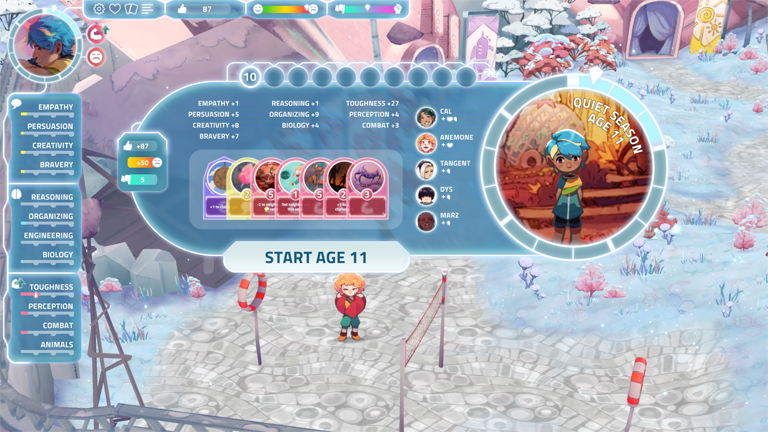
In practice, however, the mechanic is severely undercut by the fact that events have stat requirements and while Sol carries memories of past lives forward, their attributes restart at zero at the beginning of every new playthrough (which may work for physical attributes – like toughness – but makes no sense for acquired knowledge). Pair that with the fact that said influential events are spaced out between hours of drudgery you've already experienced (which cannot be skipped) and what you get is a Formula for Diminishing Enthusiasm: my first playthrough had me standing on hoof tips in anticipation — but I couldn't be bothered to get halfway through the second. You could say it just wasn't in the cards.
If you are more patient than I, or willing to keep at the game for longer, there's a lot to like in I Was a Teenage Exocolonist: the art, characters, story and sound are first-rate and quite enjoyable. But do make sure you're okay with repetitive gameplay that may need multiple playthroughs for the best outcome, as that's one aspect of the game that its Solid Design simply doesn't cover.
Pig Recommends:
- -like Gwent (the fun, supplementary, offline mechanic from Witcher 3), but hate Gwent (the microtransaction-laden, online-only, CDPR cash-cow)? try Thronebreaker: an odd mix of Gwent and story that tells the tale of a queen's struggle to win back her throne; it feels like a weird proposition, but – strangely – works really well, with nice art and sound, a good story and just enough card-playing to make for a fun experience that doesn't overstay its welcome;
